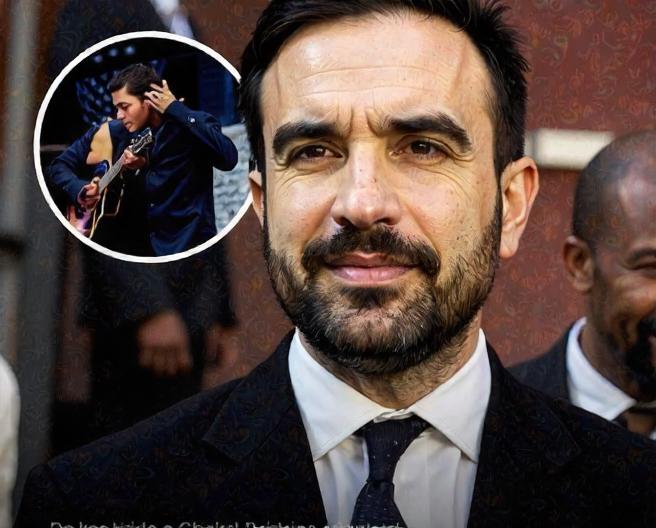As New York City celebrates its newest mayor, another figure has quietly drawn public fascination — his artist wife, whose quiet creativity and guarded privacy have now become part of the city’s biggest story.
Against all odds and expectations, 34-year-old democratic socialist Zohran Mamdani has emerged as the Big Apple’s next mayor — a result that has rewritten the city’s political script and caught even seasoned observers off guard.
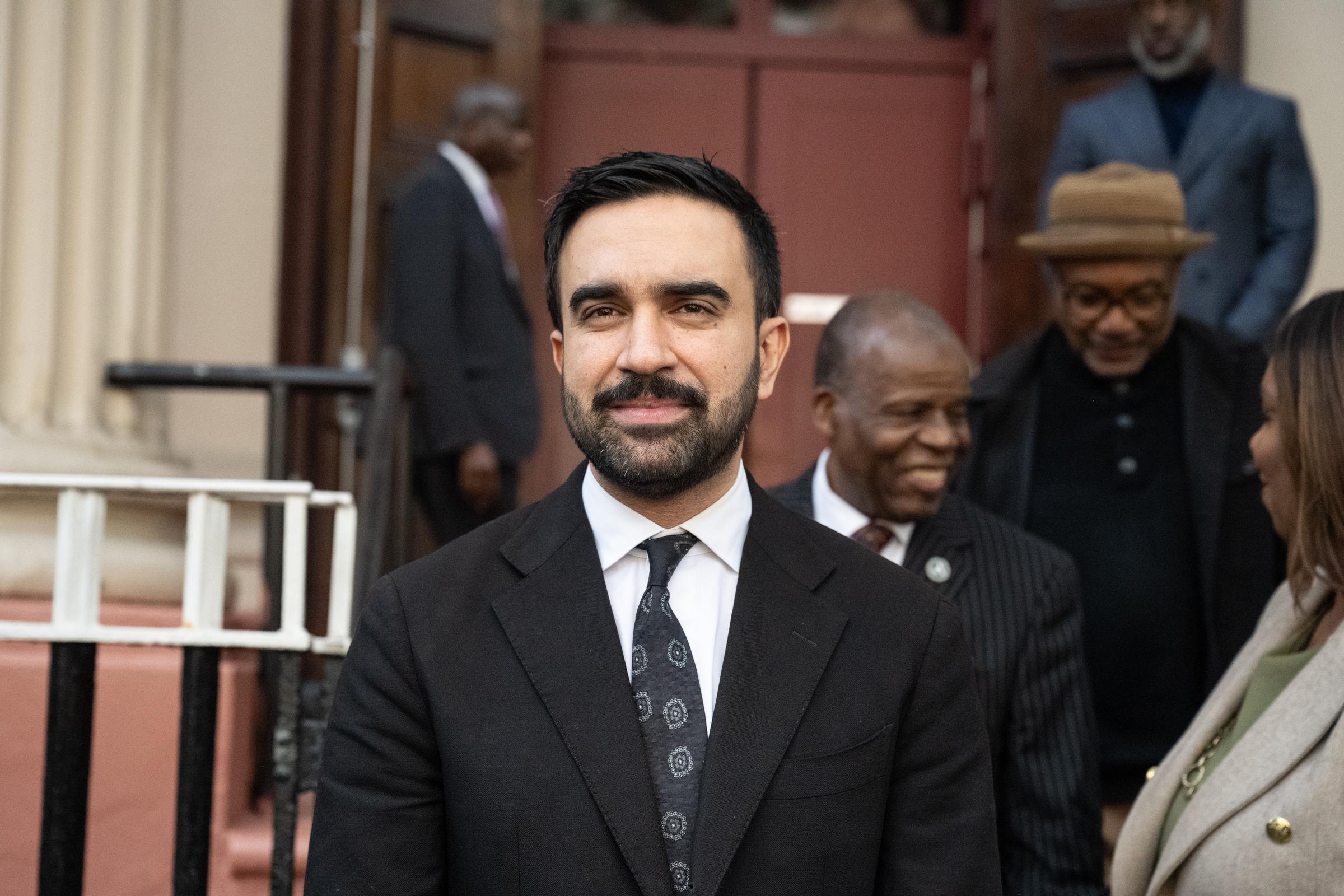
Zohran Mamdani attends a campaign event in the Brooklyn borough of New York City on November 1, 2025. | Source: Getty Images
As the celebration around his victory settled, another story began quietly unfolding — that of his wife, Brooklyn artist Rama Duwaji, whose gentle expressions had suddenly met the glare of the metropolis’s spotlight.
Once a freelance illustrator navigating post-college life, Duwaji met Mamdani in 2021 on the dating app Hinge — a modern fairytale beginning that blossomed into a whirlwind romance. They tied the knot at the City Clerk’s office in early 2025.
A Private Muse in the Public Eye
In a profoundly personal Instagram post on May 12, 2025, Mamdani poured his heart out:
“Three months ago, I married the love of my life, Rama, at the City Clerk’s office. Now, right-wing trolls are trying to make this race — which should be about you — about her. Rama isn’t just my wife, she’s an incredible artist who deserves to be known on her own terms.”
Despite becoming a subject of widespread fascination since Mamdani’s campaign took off, Duwaji has been noticeably absent from the limelight. According to The New York Times, she declined all press after the primary election, sharing that the sudden flood of attention was overwhelming.
To her close circle, however, Duwaji is already a beloved icon. Photographer Hasnain Bhatti, 32, didn’t mince words, saying, “She’s our modern day Princess Diana.”
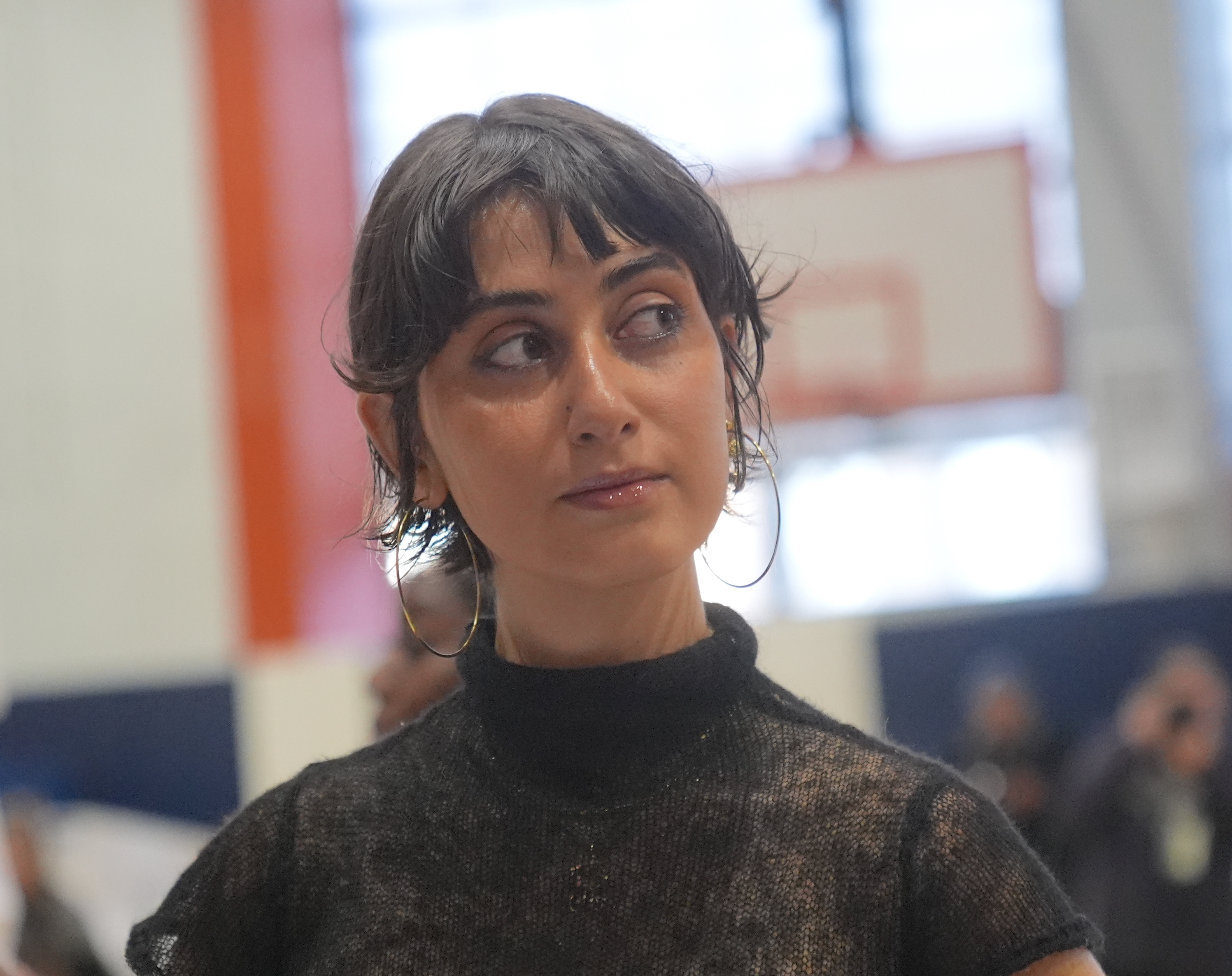
Rama Duwaji is at a polling station in Astoria, Queens, on Election Day in New York City on November 4, 2025. | Source: Getty Images
Her Syrian Roots, Her Art, Her Voice
Born in the United States, Duwaji has frequently discussed the complexity of her Syrian American identity. On a podcast, she revealed, “I was born in the States and lived here till I was nine.” She added that before the war in Syria, she would sometimes deny that part of herself, telling people she was only American.
Professionally, Duwaji has carved a name for herself as a Syrian illustrator and animator whose work digs into themes of sisterhood and community. Working from her Brooklyn studio, she has built an impressive portfolio that spans The New Yorker, The Washington Post, BBC, Apple, Spotify, VICE, and Tate Modern.
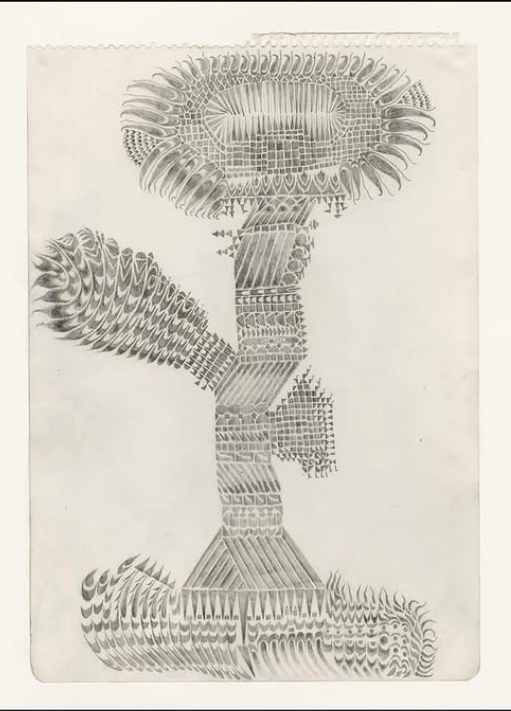
One of Rama Duwaji’s art, as seen from a post dated June 12, 2025. | Source: Instagram/ramaduwaji
She has also lent her expertise to the next generation of creators, teaching illustration and animation workshops with It’s Nice That, a London-based digital media platform and creative publisher, in 2021. Although most of her work is digital, Duwaji also handcrafts ceramic pieces — a physical outlet for her artistic vision, blending pottery with her love for illustration.
In 2024, Duwaji earned her MFA in Illustration as a Visual Essay from the School of Visual Arts, where her thesis project, “Sahtain!” — Arabic for “bon appétit” — transformed the act of cooking together into a vivid meditation on memory, belonging, and joy.
Riccardo Vecchio, chair of her graduate program, offered high praise for her dedication. “Very focused on her work,” he said, noting her commitment to exploring perspectives underrepresented in Western art.
His Ugandan Roots, His Politics, His Vision
Standing beside her is an equally remarkable figure — Mamdani himself. Before stepping into City Hall, he served the 36th Assembly District — home to Astoria, Ditmars-Steinway, and Astoria Heights. Born in Kampala, Uganda, he immigrated to New York City at age seven and later became a U.S. citizen in 2018.
A graduate of the Bronx High School of Science and Bowdoin College, where he earned a degree in Africana Studies, Mamdani’s life took a decisive turn when he worked as a foreclosure prevention housing counselor, helping low-income families in Queens. That experience, he said, opened his eyes to systemic inequality — and launched his political career.
Since entering public service, Mamdani has pushed a radical message: that the market should not determine dignity. His rise has also been historic — the first South Asian man, the first Ugandan, and only the third Muslim ever elected to New York State’s Assembly.
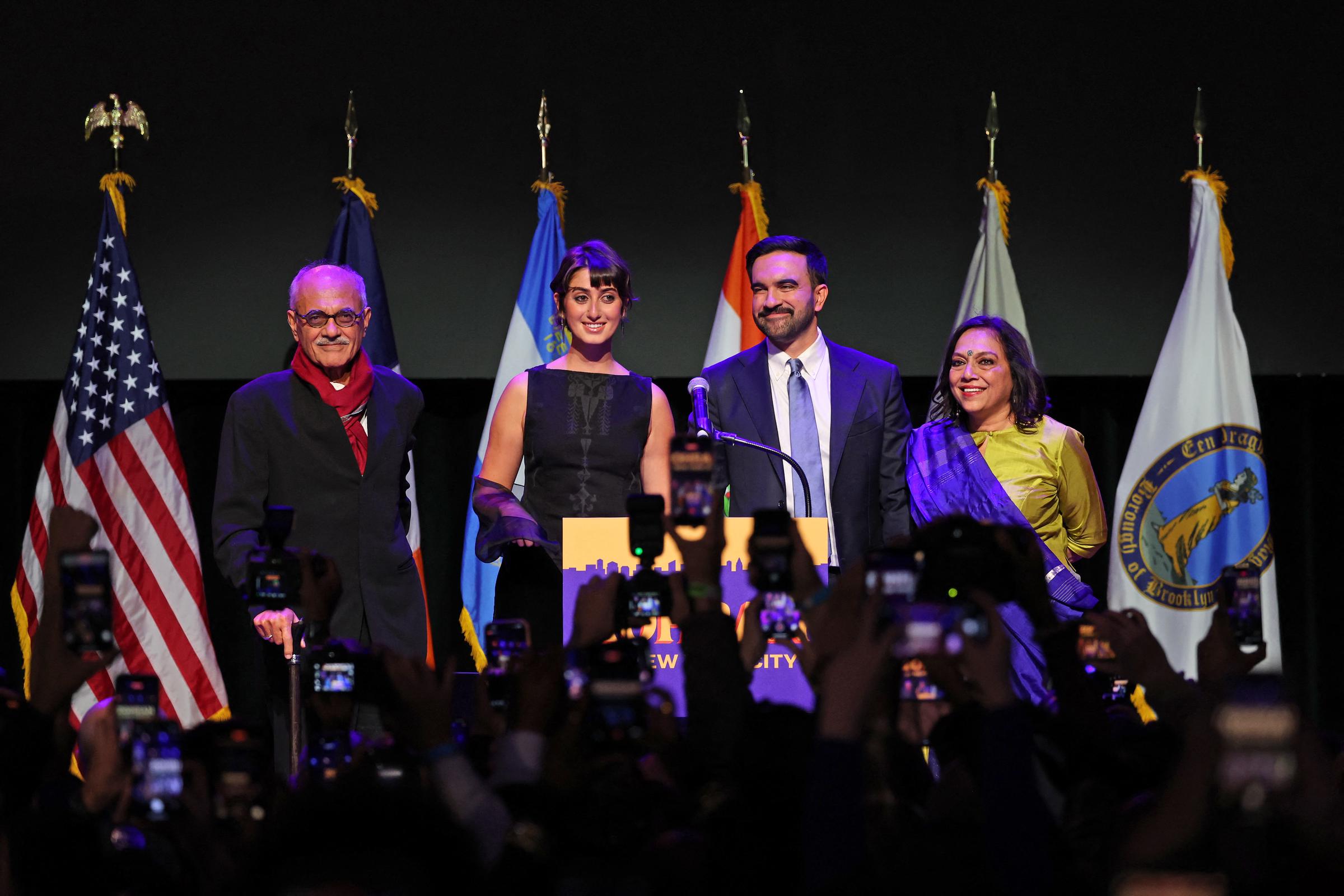
Zohran Mamdani celebrates alongside his wife Rama Duwaji, his parents Mahmood and Mira Nair during an election night event at the Brooklyn Paramount Theater in New York on November 4, 2025. | Source: Getty Images
‘Rama Is Giving First Lady!!!’: Social Media Erupts
But as Mamdani accepted his victory, the internet’s gaze swung toward his wife — with admiration and infatuation colliding across platforms. On X, one fan posted, “Congrats to Zohran Mamdani on beating Andrew Cuomo. Rama is easily the most stunning First Lady in NYC’s history.”
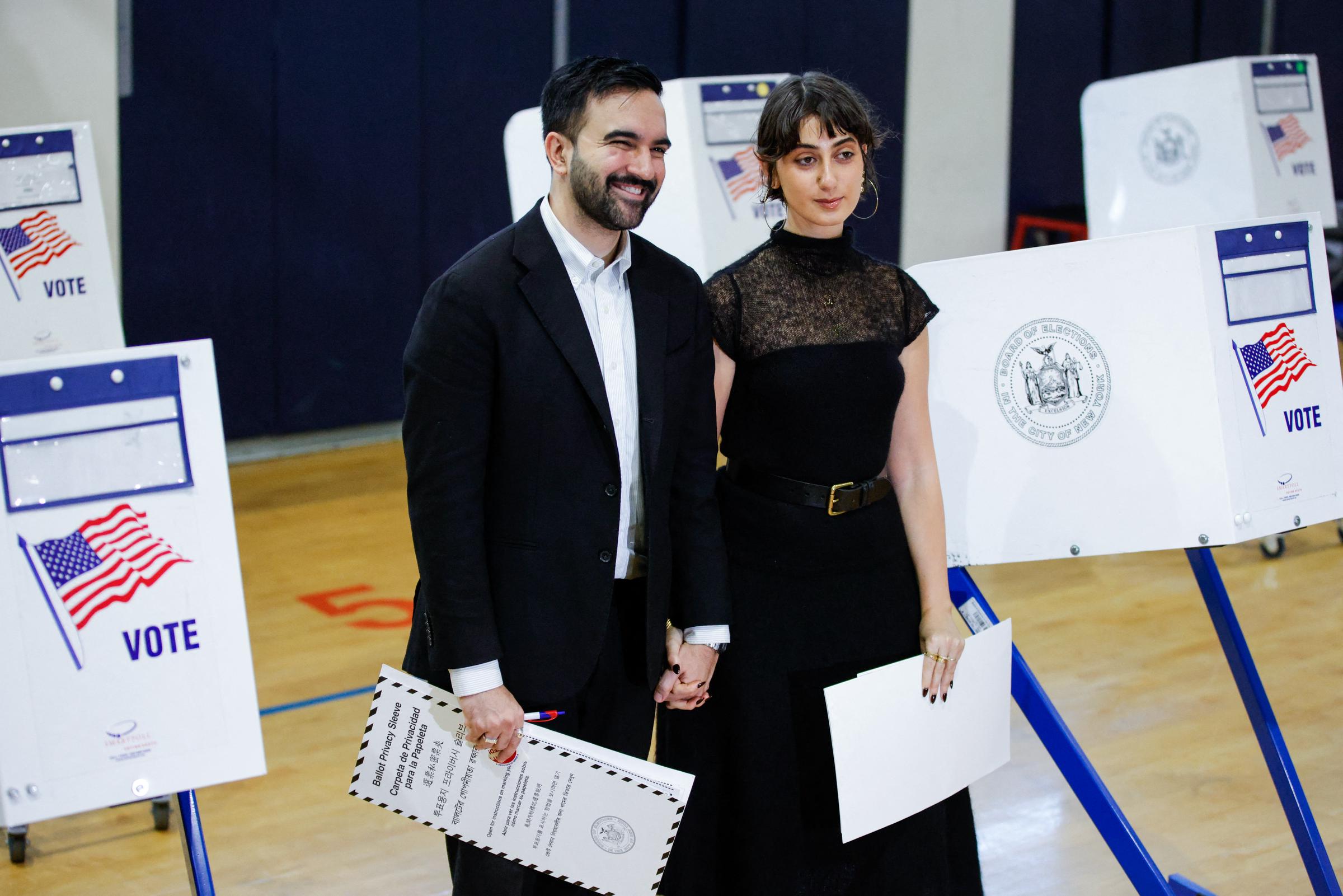
Zohran Mamdani holds hands with his wife Rama Duwaji after they voted in the Queens borough of New York City on November 4, 2025. | Source: Getty Images
Another wrote, “mamdanis wife rama duwaji is so beautiful it really goes to show how being a kindhearted and friendly man will get you a beautiful and artistic wife [sic].” A third post echoed the sentiment, “Will Rama Duwaji become the most stunning First Lady in American history? Maybe.”
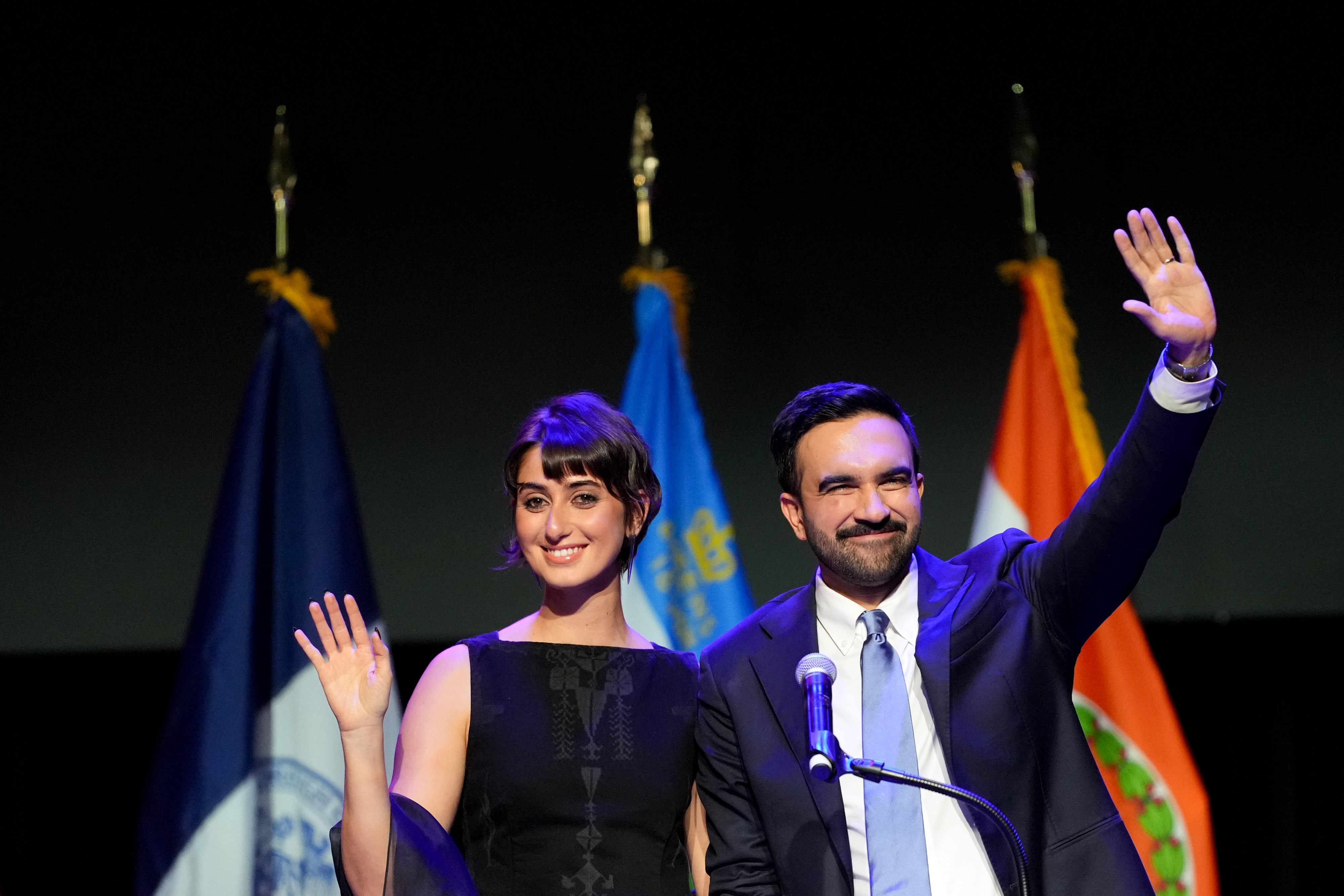
Zohran Mamdani and Rama Duwaji. | Source: Getty Images
Reddit wasn’t far behind. One commenter gushed, “That face card is lethal. She’s stunning,” while another declared, “She is [sic] real stunner!” Over on TikTok, the praise was even more poetic. “Wow, she give [sic] me such Princess Diana vibes. Her eyes are so expressive 💕,” one viewer wrote. Another added, “Rama is giving first lady!!! So poised! ✨♥.”
Whether she chooses to step forward into the public sphere or remain behind the scenes, Duwaji is already shaping a reimagined image of what a First Lady can be — one who embodies art, empathy, and quiet power.
After the Killing of Charlie Kirk and the Attempted Assassination of Donald Trump, Another Major Political Figure Is Reportedly the ‘Prime Target’
New York City’s first Muslim mayor-elect wins in a landslide — but is the public figure now a marked man in politics?
A prominent political figure is making headlines not just for his recent victory, but because there is fear that he may become the next victim of political violence in the United States (U.S.).
Such violence has been on the rise since the killing of political activist Charlie Kirk and the attempted assassination of President of the United States Donald Trump, whom the political representative had a few choice words for during a recent speech.
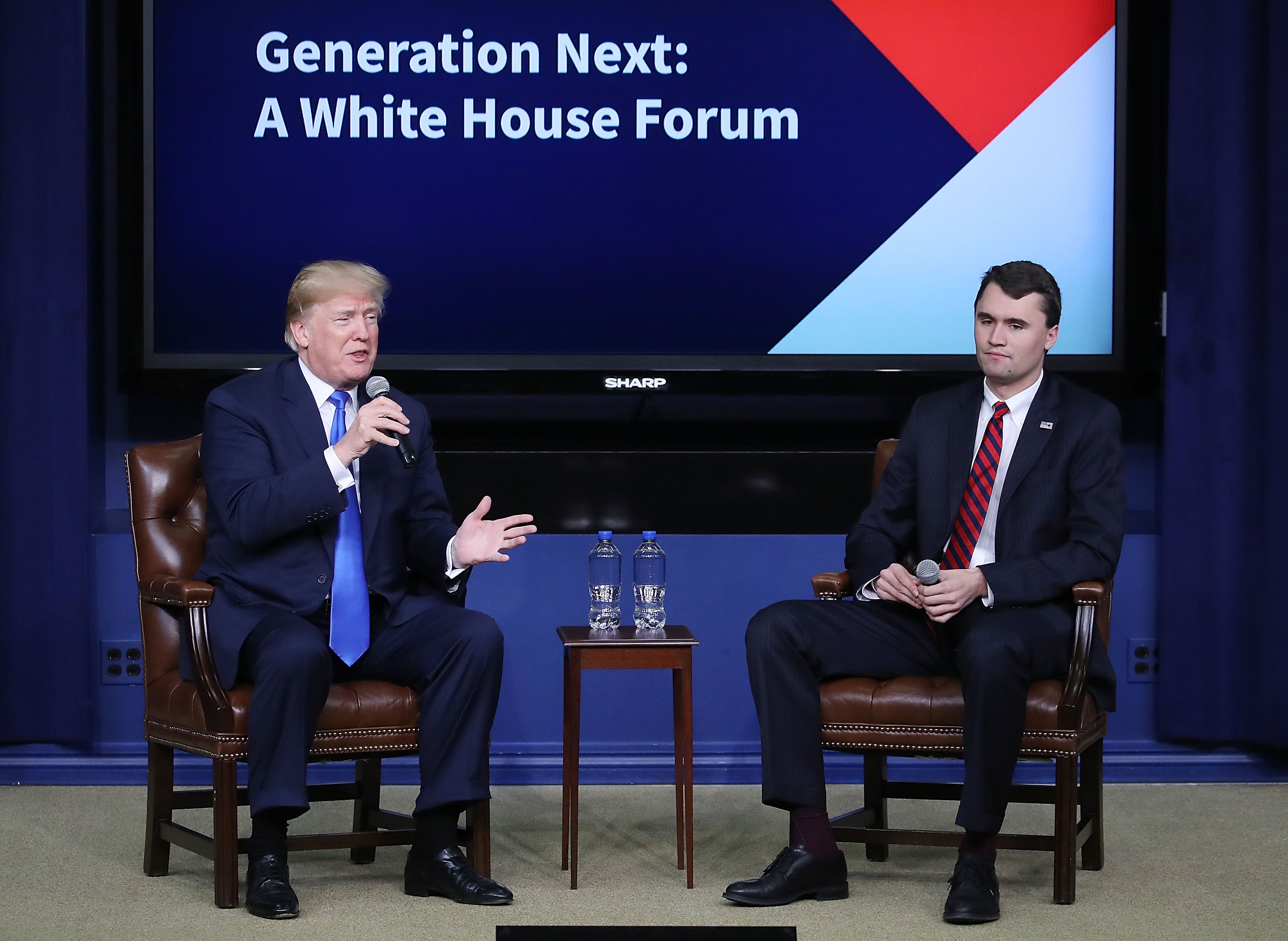
U.S. President Donald Trump and Charlie Kirk on stage at the Generation Next Summit in Washington, D.C., on March 22, 2018. | Source: Getty Images
‘Prime Target’ in a Nation on Edge
Concerns over Zohran Kwame Mamdani’s safety have escalated sharply, with supporters increasingly vocal about the fear that he could become the next “prime target.” Given that political violence has gripped the nation, including the June killing of a Democratic state legislator in her home, Mamdani’s visibility makes him vulnerable.
His campaign was said to be acutely aware of the risks, with strict protocols reportedly in place: journalists had to RSVP or send a text message ahead of time just to learn the location of public events.
The heightened security underscores a sobering reality — while Mamdani has not shied away from his public duties, every handshake, rally, or open appearance is shadowed by the unsettling possibility of a deadly encounter.
Mamdani, who publicly condemned the killing of Kirk and urged Americans to return to a “shared notion of humanity that binds us all,” is said to be struggling to strike a balance between staying connected to the people and protecting his own life.
‘I Hope You All Die Painful Sudden Deaths’: Before a Historic Win, There Were Serious Threats
Before he took the stage as New York City (NYC) mayor-elect, Mamdani was already facing threats that would rattle even the most seasoned politician.
As a then-mayoral candidate, the 34-year-old state assemblyman endured a string of chilling and graphic messages — so disturbing that they led to a 22-count grand jury indictment against a Texas man, Jeremy Fistel, who allegedly orchestrated the campaign of harassment. Prosecutors say the threats began in June 2025 and continued through July, delivered through phone calls and web messages directed at Mamdani’s office.
According to the Queens District Attorney, Fistel allegedly demanded that Mamdani — a Ugandan-born, self-described democratic socialist — “return to Uganda” before someone shoots him in the head. In another message, he was reportedly called a terrorist, not welcomed in New York, and warned to watch not only his own back, but also his family’s.
One particularly gruesome message sent via Mamdani’s campaign website wished him terminal cancer and detailed an appalling fantasy of watching his loved ones get murdered.
“I’d love to see an IDF bullet go through your skull,” the message also read. “Would be even better if you had to watch your wife and kids murdered in front you before they end your pathetic miserable life…I hope you all die painful sudden deaths. Do us all a favor and kill yourself [sic].”
The threats escalated in both tone and frequency. On June 18 — the same day Mamdani’s staff first alerted law enforcement — Fistel left another voicemail expressing similar sentiments.
Though the caller ID was blocked, investigators eventually traced the source to Fistel’s cellphone and email account. Fistel, who was arrested in Texas and extradited to Queens, faces multiple felony charges, including making a terroristic threat as a hate crime, aggravated harassment, and related offenses.
Prosecutor and Mamdani’s Office Denounce the Threats
If convicted of the top charge, he could face up to 15 years behind bars. Queens District Attorney Melinda Katz denounced the threats in a public statement, “Let me be very clear — we take threats of violence against any office holder extremely seriously — and there is no room for hate or bigotry in our political discourse.”
Mamdani’s campaign responded with both gratitude and defiance, thanking Katz’s office for its swift action while reaffirming the values Mamdani has vowed to protect.
“We cannot and will not be intimidated by racism, Islamophobia, and hate,” the campaign said in a statement. “Zohran remains steadfast in his conviction that New York must be a city where every single person — regardless of faith, background, or identity — is safe, protected, and at home.”
A Stunning Victory, and a Historic First
Despite the torrent of hate and violence aimed in his direction, Mamdani’s resolve never wavered — and on Tuesday night, November 4, that determination culminated in a groundbreaking victory.
The Democratic nominee was officially elected as the 111th mayor of New York City, defeating former governor Andrew Cuomo, Republican candidate Curtis Sliwa, and former NYC Mayor Eric Adams in a high-stakes race that captured national attention.
With more than one million votes, Mamdani secured 50.4 percent of the total, while Cuomo trailed behind at 41.6 percent. Sliwa followed with just over seven percent of the vote, and Adams had only 0.3 percent. The win isn’t just a political triumph — it is a historic moment.
By clinching the top office in America’s most iconic city, Mamdani became the first Muslim mayor in NYC’s history, breaking a barrier that had long stood unchallenged in the city’s political landscape.
Taking on Trump’s Empire, One Policy at a Time
Taking the stage in front of a roaring crowd, Mamdani delivered a victory speech that was both celebratory and confrontational, and no one drew more of his ire than Trump. The newly elected mayor didn’t hold back, zeroing in on the president with a blend of defiance and unapologetic clarity.
“Donald Trump, since I know you’re watching, I have four words for you: turn the volume up,” Mamdani said. It wasn’t just a soundbite — it was a signal. Mamdani was making it known that his administration would not shy away from calling out what he dubbed the corrupt forces entrenched in the system, many of which he directly associated with Trump.In his speech, Mamdani pledged to dismantle what he described as the “culture of corruption” that allowed billionaires like Trump to exploit tax breaks and escape accountability.
He promised to hold bad landlords accountable — invoking the legacy of Trump’s real estate empire — and vowed to champion stronger labor protections by standing shoulder to shoulder with unions. “So hear me, President Trump, when I say this, to get to any of us, you will have to get through all of us,” he warned.
But his remarks weren’t limited to criticism. The newly minted mayor laid out a sweeping, idealistic vision for the future of NYC — one defined by rent freezes, universal childcare, free public transit, and a fundamental transformation of how local government serves working people.
Quoting figures like Eugene V. Debs and Jawaharlal Nehru, Mamdani framed his win as a generational pivot — away from political caution and toward bold reform. In a political moment defined by division and volatility, Mamdani’s speech struck a chord — fiery, fearless, and reflective of a new kind of leadership on the rise.
From Kampala to City Hall: Who Is Zohran Kwame Mamdani?
Mamdani’s impassioned address may have marked the dawn of a new political era for New York, but it also left many asking: Who is the man behind the podium? A three-term state assemblyman and lifelong organizer, Mamdani is no stranger to underdog campaigns.
Born in Kampala, Uganda, and raised partly in Cape Town, South Africa, Mamdani moved to NYC at age seven, later attending Bronx High School of Science and earning a degree in Africana Studies from Bowdoin College. He became a U.S. citizen in 2018, just two years before launching his first successful bid for public office.
Mamdani’s political awakening didn’t start in the halls of government — it began on the streets and in schoolyards. In high school, he co-founded the school’s first-ever cricket team, an early lesson in grassroots organizing.
His activism expanded in college, where he co-founded a Students for Justice in Palestine chapter and later organized nationally with progressive movements advocating for health care access and electoral change.
Before politics, Mamdani worked as a housing counselor, helping Queens homeowners fight foreclosure. That work exposed him to the brutal consequences of profit-driven housing policy — a reality that pushed him to run for office.
From Rap Videos to Viral Campaigns
Even his more unconventional past — including a stint as a self-described C-list rapper under the name Mr. Cardamom — played a surprising role in building his campaign’s identity. Though opponents tried to mock him by resurfacing a shirtless music video titled “Nani,” Mamdani’s team embraced the moment.
“An incredible asset for anybody seeking to run for office is bravery in the face of embarrassment,” one aide, Andrew Epstein, noted, arguing that his willingness to lean into discomfort helped him connect with voters.
It was that bold, relatable energy that propelled Mamdani from outsider to frontrunner. He ran a trailblazing digital campaign, producing multilingual content in Urdu, Bangla, Arabic, and Spanish, and speaking directly to working-class New Yorkers — even Trump voters — about issues like inflation and rent.
One viral video on what Mamdani referred to as “halal-flation” showed him braving freezing temperatures to ask passersbyers whether they’d prefer to pay $10 or $8 for halal food. This highlighted how small business costs are shaped by outdated policies.
He faced millions in opposition spending from New York’s business and real estate sectors, many of whom were alarmed by his democratic socialist platform. Yet Mamdani — who met his beloved wife, Rama Duwaji, on the dating app Hinge — turned the attacks into ammunition.
His campaign became a battle cry against corporate power and economic inequality, framing the race as one between “fighters and fakers.”
Now, as the first Muslim and Ugandan-born mayor of NYC— and a rare figure in American politics who proudly identifies as a democratic socialist — Zohran Kwame Mamdani is determined to prove that bold ideas and broad coalitions are not only possible, but powerful.
